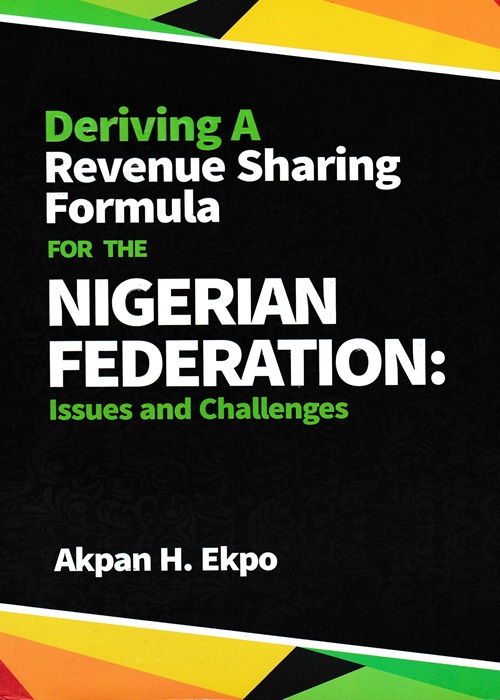Deriving A Revenue Sharing Formula for the Nigerian Federation: Issues and Challenges by Akpan H. Ekpo
$10.00
Acknowledgments
In 2013, the West African Institute for Financial and Economic Management(WAIFEM) bided and won a contract from the Revenue Mobilization, Allocation and Fiscal Commission (RMAFC) to undertake a project to derive a new revenue allocation formula for the Nigerian Federation. WAIFEM completed the study and made recommendations to the Commission. The Commission after a careful study of the report was to make suggestions to Government. Thereafter, government was to recommend to the National Assembly who has the constitutional responsibility to enact a new revenue formula. After five years of submitting the study, nothing has happened and with the coming to power of a new government on May 15, 2015, it seems unlikely whether the agitation for a new revenue formula will occupy the present government.
Based on my experience as a participant in the public policy space in Nigeria, I took the decision that the essentials of the study particularly the processes, methodologies, perception of stakeholders and outcomes be made available to the reading public as well as those interested in burning issues and challenges relating to deriving a revenue allocation formula for federal systems like Nigeria. The detailed report remains with the Commission. It is hoped that someday the Commission would share its recommendations with government. Many completed significant reports and studies commissioned by government have never seen the light of the day. The idea is to make this report on deriving a new revenue formula an exception.
I wish to thank the then Chairman of the Commission, Engr. Elias Mbam who gave us the opportunity to undertake the project. We are also grateful to his commissioners from all the states and the FCT as well as the management and staff for cooperating with us during the exercise. Their commitment to ensure a hitch free exercise would remain never green in our memories. We are grateful to all the relevant agencies in the 36 states and the FCT for their’submissions and interactions during the meetings in the six geo-political zones.
I must place on record the contributions of Professor Festus Egwaikhide, Professor Doughlason Omotor, Dr. Udoma Afangide, Dr. Elijah Udo, the late Mr. Sulaiman Bello, Mr. Alvin Johnson, Nlr. Aniekan James and a host of others who went beyond the call of duty in ensuring the completion of the project. Furthermore, appreciation goes to the Chairman and board of WAIFEM for approving the project under the consultancy unit of the Institution and for providing a conducive environment to undertake the study.
This book represents an important contribution to the issues and challenges in the derivation of a revenue formula for federal systems. It is highly recommended to all stakeholders in Nigeria and to those interested in the country’s economic development.
Akpan H. Ekpo
Professor of Economics & Public Policy
Director General, WAIFEM
Lagos, Nigeria.
June 2018
Description
Table of Contents
-
CHAPTER ONE: INTRODUCTION
- Background
- Rationale for Reviewing the Existing Revenue Allocation Formula
- Challenges of Revenue Allocation in Nigeria
-
CHAPTER TWO: OVERVIEW OF PAST EFFORTS AT DERIVATION OF REVENUE ALLOCATION FORMULA FOR NIGERIA
- Phillipson Commission of 1946
- The Hicks-Phillipson Commission ( 1951)
- The Chick Commission (1953)
- The Raisman Commission (1958)
- The Binns Commission (1964)
- Decree No. 15 of(1967)
- The Dina Committee (1969)
- Decree No. 13 (1970)
- Decree No. 9 (1971)
- The Aboyade Technical Committee (1977)
- Okigbo Commission or Presidential Commission (1979)
- Recommendations of Political Bureau of 1986
- Report of the l994/95 Constitutional Conference Committee on Revenue Allocation
- Revenue Allocation in the 1999 Constitution
-
CHAPTER THREE: METHODOLOGY
- Introduction
- Review of Revenue Allocation Principles
- Analysis of Vertical Revenue Sharing Principles in Nigeria
- -Overview of Horizontal Revenue Sharing Principles in Nigeria.
- Assignment of Expenditure Functions and Tax Powers in Nigeria
- -Division of Expenditure Responsibilities
- -Assignment of Taxes
-
CHAPTER FOUR: ANALYSIS OF PUBLIC FINANCES IN NIGERIA
- Federally Collected Revenues and Federation Account
- Revenue and Expenditure Pro?les of the Three Tiers of government
- Profile of Federal and State Unemployment rates, 2007 — 2011
-
CHAPTER FIVE: INTERNATIONAL EVIDENCESILESSONS FROM OTHER FEDERATIONS
- Assignment of Expenditure Functions and Tax Powers
- Division of Expenditure Functions and Taxes in Brazil
- -Assignment of Expenditure Responsibilities in Brazil
- -Assignment of Taxes in Brazil
- Canada Experience
- -Tax Assignment
- -Expenditure Responsibilities
- Ethiopia’s Fiscal Federalism
- -Assignment of Expenditure Functions in Ethiopia
- -Division of Tax Power in Ethiopia
- Division of Functions and Tax Assignment in Germany
- -Expenditure Assignment
- -Assignment of Taxes
Assignment of Expenditure Functions and Tax Powers in India
- -Assignment of Expenditure Functions in India
- -Tax Assig:nment in India
- Division of Expenditure and Tax Assignment in the United States of America
- -Assignment of Expenditure Responsibilities
- -Tax Assignment
- South Africa
- Indonesia
- The Malasian Federation
- Austria
- Spain
- Lessons for Nigeria
-
CHAPTER SIX: DERIVING THE RECOMMENDED REVENUE ALLOCATION FORMULA: AN ANALYSIS
- Introduction
- Memoranda Received and Retrieved Questionaire on Revenue Allocation
- Vertical Revenue Allocation
- -Analyses of Expenditure Profile
- -States Governments’ Proposals on Vertical Revenue Allocation
- -Local Government Councils‘ Proposal on Vertical Revenue Allocation
- -Proposals on Vertical Revenue Allocation by Individuals, Interest Groups and Retrieved Questionaire
- Combined Proposals on Vertical Revenue Allocation Based on Memoranda Received and Total Expenditure
- Assignment ofweights on Functional Expenditure Responsibilities
- Derivation Principle
- Horizontal Revenue Allocation
- -Analysis of Proposal by States for Horizontal Revenue Allocation
- -Local Government Proposals on Horizontal Revenue Allocation
- -Average Proposal by Local Govemment Councils on various Horizontal Allocation Criteria
- -Combined Proposal on Horizontal Revenue Allocation
- Summary of the Recommended Revenue Allocation Formula
- Statutory Grant Fund
- Funding of Primary Education
- Horizontal Allocation Formula
- Derivation
CHAPTER 7 CONCLUSION
Questions and Answers
You are not logged in

